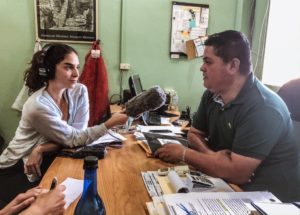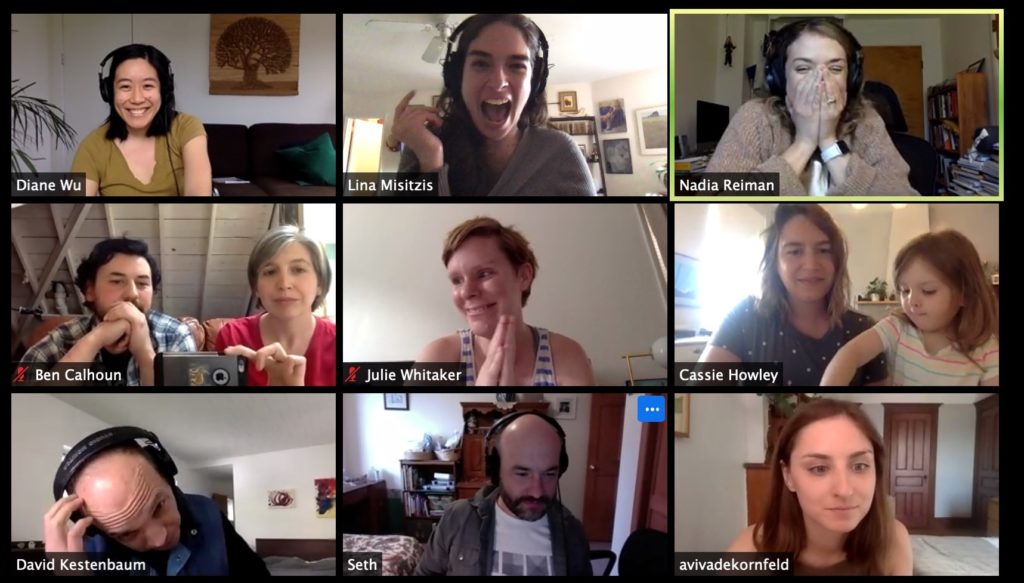The night of the 2020 Pulitzer Prize ceremony, Lina Misitzis and her colleagues at This American Life were together only as squares on a video call, sheltering in place around the country as the COVID-19 pandemic raged on. Their episode, “The Out Crowd,” was being recognized for its intimate, harrowing investigation of the consequences of the Trump administration’s “Remain in Mexico” policy. When the team won the first-ever Pulitzer for Audio Reporting, many members were home alone in their pajamas.
“I was so green. I cried in the bathroom every day and sometimes I didn’t even make it to the bathroom”
It was a surreal moment for Misitzis. It was the peak of the pandemic, yet she had spent a hilarious few weeks completing a comedy podcast with comedians Nick Kroll and John Mulaney. She had just won the most prestigious award in the field she hadn’t planned on pursuing. And she was celebrating with the team at This American Life, even though she considers being rejected for a job by Ira Glass to be a turning point in her career.
A soft rejection from Ira Glass
The original plan had been to write for television, but time spent as an NBC page did not leave Misitzis feeling optimistic about TV. Instead, she was drawn to a group of people from NPR whom she met while on assignment at The Rachel Maddow Show. “The way they talked about NPR sounded like paradise,” says Misitzis, so she set her sights on radio and soon landed an interview for a position as Ira Glass’ administrative assistant. But what seemed like a golden ticket was really a dead end: “He said to me, ‘working for me isn’t going to teach you anything about storytelling. If you expect to work here for a few years and have me promote you, that’s not gonna happen. So, if you want to learn how to tell stories you have to go somewhere else.’ I took that to heart.”
Freed from administrative purgatory, Misitzis found her footing with political journalist Andrea Seabrook, learning the technical basics of podcasting as she helped launch DecodeDC. Over the next five years, Misitzis freelanced voraciously, at one time forcing herself to pitch an audio story every week.

Some stints were ill-fated. Misitzis lasted only nine weeks as Reply All’s first producer. “I was so green. I cried in the bathroom every day and sometimes I didn’t even make it to the bathroom,” she says. Others opened doors. While working at Ask Me Another, Misitzis developed a strong relationship with the executive producer, Jesse Baker. When Baker left to join Audible’s Original Content team as vice president, Misitzis followed. It was time for Misitzis to take the reins of storytelling.
The Butterfly Effect
At Audible, Misitzis was assigned to work with Jon Ronson on his new podcast, The Butterfly Effect. It was the first foray into audio for Ronson, the author of books like The Psychopath Test and screenwriter of movies like Okja, and the pair hit it off right away. Setting out to answer the question of how the adult film industry would survive endless free internet porn, they created a uniquely sensitive portrayal of the business and the people within it, treating the subject with a genuine respect that the media rarely affords sex work. “Most porn stories that make it into mainstream media only get there because something extraordinarily problematic or upsetting has happened, and the media is only interested in representing that one thing,” Misitzis says. “So, usually it’s someone showing up with some aggressive first question like, ‘what makes you think it’s okay to commodify your body?’ I think the fact that we were asking something that wasn’t inherently charged was the big difference.” Misitzis also stresses the importance of spending time within the community rather than dipping in and out solely to drill people with interviews. She spent two or three weeks a month in California while reporting, and fully immersed herself into the industry by, “going to set every day with this director who’s basically the protagonist, Mike Quasar. Mike only shoots boy/girl porn, and there’s only about fifty people in that pool at any given time. Everyone knew me by the end.”
“There’s a difference between knowing the story you want to tell and working backwards from there to tell it, and having a question that you genuinely want to know the answer to and looking for the answer.”
Misitzis’ and Ronson’s reputation in the porn world granted them trust and access to report on a delicate tragedy in the show’s second season. Shortly after research on The Butterfly Effect wrapped in the summer of 2017, a performer who hadn’t been involved in the first season, August Ames, committed suicide. She had been the target of a Twitter pile-on in response to her tweets about refusing to work with male performers who also shot gay scenes. Many fellow porn performers and the internet masses accused Ames of being homophobic and, as is often the case once the ball starts rolling, several tweets urged Ames to kill herself.
Her death quickly became political fodder for those who insisted that the wrath of “social justice warriors” far outweighed the threat of any of the causes they rally against. A few years earlier, the nuances of Ronson’s book So You’ve Been Publicly Shamed had been erased by this same crowd, which heralded it as a manifesto against social media shaming (as long as they disagreed with the political agenda of the shaming). Ronson therefore became a natural choice to investigate whether the cause and effect of Ames’ death was truly as simple as cyberbullying gone too far, and this became the subject of the podcast’s second season, The Last Days of August.
Kevin Moore, Ames’ husband, was a fierce advocate for the cyberbullying narrative and trusted Ronson and Misitzis to do justice to his wife’s story. That story, however, ends up being an intricate attempt to answer the ultimately unanswerable questions that those grieving have in the wake of a suicide. The season does not neatly conclude with an explanation for Ames’ decision—although it’s clear it’s much more complicated than Moore insists—and chooses to instead paint a fully fleshed-out portrait of Ames’ life and mental state at the time of her death. It flirts with becoming a typically provocative true crime podcast, casting suspicion on Moore and other characters in Ames’ life for having some blame to bear along with the Twitter shamers, and even ending the first episode hinting that Ames’ death was a homicide. But, like Butterfly, its power is in its restraint, in never succumbing to exploitation. Ronson is forthright about this intention at the top of the second episode, saying, “I don’t want this to be one of those shows that creates narrative tension by fueling suspicion that a person might be a murderer. So I want to tell you that while we uncover some extraordinary, unexpected things, and devastating mysteries will reveal themselves and be solved, this will not turn out to be a murder mystery.”
“In the kind of show where someone is trying to figure out where the missing girl really went all those years ago, what I’ve noticed is that usually the person telling that story has a theory and has decided that they know what really happened, and then they’re just looking for clues to back that up,” says Misitzis. “And that’s just not what reporting is. There’s a difference between knowing the story you want to tell and working backwards from there to tell it, and having a question that you genuinely want to know the answer to and looking for the answer.”
Misitzis credits Ronson with guiding their investigation with a steady hand. “There were times when we were reporting where it seemed possible that something insidious had happened, but any time it seemed like the answer to a question might be the most scandalous option, Jon would play devil’s advocate and come up with 15 reasons why it’s probably not true. Trying to disprove that anything actually bad happened should really be the mission of true crime, that’s how I feel about it.” Working with Ronson, Misitzis developed the investigative journalism skills that would serve her well in her next role at This American Life.
Finding the story
When Misitzis made her way to This American Life, it was to work as a producer, not as the person answering Ira Glass’ phone. Despite being part of a much larger team, the actual work felt familiar since each episode is created by only a small group of people. What needed some adjustment was Misitzis’s concept of a story. “Oftentimes I’ll pitch a story and the response I get is ‘that’s too big.’ Like, ‘what you’re pitching would take you two years to come up with three hours of an answer for, and we’ll never make a weekly radio show if you do that.’ I’m still getting used to scaling down.”
The stories told in Misitzis’s voice over the past year have addressed this challenge by condensing stories of intergenerational relationships into one specific scene — like traveling with her family to Greece for the customary exhuming of her grandmother’s bones to make room for more burials in the country’s finite landscape (Ep. 689, “Digging Up the Bones”) — or by contributing to the show’s more lighthearted themes — like finding someone who earnestly enjoyed the movie Cats. “It was so hard to make,” Misitzis says about the Cats segment (Ep. 695, “Everyone’s a Critic”). “Everything that you put in an episode of radio has to have some kind of significant meaning to it, and it was so difficult to pluck meaning from what was essentially a joke. I don’t know this for sure, but I think I maybe clocked more hours trying to put together a story about Cats than I did working on the ‘Remain in Mexico’ policy episode.”
Misitzis’ involvement with that episode — the one that edged out her reporting on Cats for the Pulitzer — began with what she called a “very brave and very stupid idea.” Producer Nadia Reiman needed another story for her episode on the “Remain in Mexico” policy, which prohibits migrants seeking refuge from waiting for their hearing within the United States. Refugees are returned to the closest point of entry in Mexico after applying for asylum, and there, they are faced with the choice to return to the countries that they’re fleeing, or stay in the Mexican border towns that have become notorious hotspots for cartel members to kidnap migrants and then extort their contacts in the US for their release. While kidnapping had been a longstanding threat, this policy has made it particularly easy for the cartel to target the large, easily identifiable groups of people being bussed to the same places at the same time every day. In her research, Misitzis found that one town in particular, Nuevo Laredo, was the epicenter of the thriving extortion economy. “This is literally what I pitched: I would walk into Nuevo Laredo from Laredo, Texas on my own and I would greet a bus full of people that are being dropped back off after having crossed into the U.S. I would hang out learning their stories, knowing that in probably a day or two half of them would go missing because they were kidnapped.”
Currently, Nuevo Laredo is classified by the State Department as Level 4, the same safety advisory level as Syria and Iraq. So, when Misitzis presented this idea to the team, she was encouraged to take a different approach. “All I knew is that I wanted to go to Nuevo Laredo,” Misitzis says, and while she researched how to do so safely, she connected with Emily Green, an immigration reporter based in Mexico City, whom Misitzis had initially approached to accompany her to Nuevo Laredo as a translator. “That’s when she told me, ‘I was just in Nuevo Laredo. I spoke to a father and son and 45 minutes later they went missing.’ And I said, well that’s the story.”

Misitzis and Green met up in Nuevo Laredo to interview people in migrant shelters who had either been kidnapped themselves or knew someone who was. There, Misitzis discovered that Green was still in touch with the family member who was being extorted for the father and son’s release. She had taught the sister how to record all of her phone calls with the cartel and was following their case. When Green heard from the sister that she had managed to pay the cartel off enough to let the father and son go, Green and Misitzis tracked them down as they continued to wait for their asylum hearing. “It was not a fluke, because Emily is brilliant, but it is so rare to hear about a story as it’s happening and then it ends up having an actual beginning, middle, and an end. What are the chances that you have before, during, and after tape of someone who’s been kidnapped?” Misitzis says. “It was the only time I’ve ever been so confident in a story. Usually if I’m working with someone I’ll say, ‘yeah, maybe I’ll get this greenlit, we’ll see.’ But I said to Emily, ‘nobody’s going to say no to this.”
The P’dcast and the Pulitzer
Misitzis knew she had an incredible story on her hands, but she did not know that her colleagues considered it worthy of a Pulitzer until after it had been submitted. As she awaited the prize announcements, the world fell apart, and then she got a call from Nick Kroll. A year and a half earlier, Misitzis had worked with Kroll and John Mulaney to create a podcast hosted by their characters, George St. Geegland and Gil Faizon, two septuagenarian roommates with a love of tuna and pranks and not much else. The idea was that the pair would discuss the life and death of Princess Diana, among other things, over the course of several episodes, but the team got too swept up in other projects to finish the season. Kroll called Misitzis a week into the pandemic, saying it was the right time to put out a podcast that would make people laugh. So, Misitzis hunkered down to complete Oh, Hello: The P’dcast.
To account for the shift in technical quality of Kroll and Mulaney finishing their recordings in different homes on opposite sides of the country, they decided to work the pandemic into the story. “The boys are just quarantining in separate rooms in the apartment to stay safe,” explains Misitzis. “They had all this material banked from a couple years ago but they want to win quarantine so they’re bringing it back and finishing it up. That’s why maybe it sounds different. Like the boys, we did what we could with what we had.” Misitzis worked with Kroll and Mulaney remotely to wrap up recording and edit hours of material into seven swift episodes. “It was really surreal. Every day of March the news was worse, especially in New York [where Misitzis lives]; it really felt like the world was ending,” she says. “But, I was sitting at the computer and laughing at like five, six hours of them going back and forth about nothing.” It sounded like a drastic change from reporting on immigration policy, but Misitzis views the projects as more or less the same. “It didn’t feel like a big change because the idea for Oh, Hello was to make a reported long-form story where the characters hosting it just happen to be fictional. So, I actually didn’t do anything that different than I do on any other story. It’s just that they weren’t ever saying the truth.”
A month after Oh, Hello’s debut, Misitzis won the Pulitzer. “I didn’t even know that there hadn’t been a prize for audio reporting until this year before we won. That’s how little even the possibility of winning a Pulitzer one day had ever occurred to me,” Misitzis says. “I’m really proud, but I just kind of laugh nervously when it comes up. I think that I work with the smartest and best people that there are, and if I were to pick a handful of people that deserve a Pulitzer it would be my colleagues. I wouldn’t put myself in that category, but it would be them.”

This reverence for her colleagues has guided Misitzis throughout her career. Above all, what draws Misitzis to a project is the passion of the creators behind them. “Everyone that I’ve worked with—Kroll, Mulaney, Ira, Nadia, Emily, Jon—are people I really like being around, who I think are brilliant and who aren’t trying to just put more content out there for the sake of churning out content,” Misitzis says. “I like that This American Life sometimes takes years to finish a story because it’s just not time yet, and that John Mulaney and Nick Kroll are choosy about what they put out in the world. I think they’ve done such an elegant job, both of them, of staying true to their voice while accommodating the evolution of what’s considered to be topical or funny. I feel really good about that.”
Where this approach will take Misitzis next is anyone’s guess, but she has been finding herself pulled in a particular direction. “I miss long-form a lot. Hiding from the world, sitting on a mountain of information and figuring out what goes where and what you still have to find out is really satisfying. I hope to return to that, eventually.”




Comments